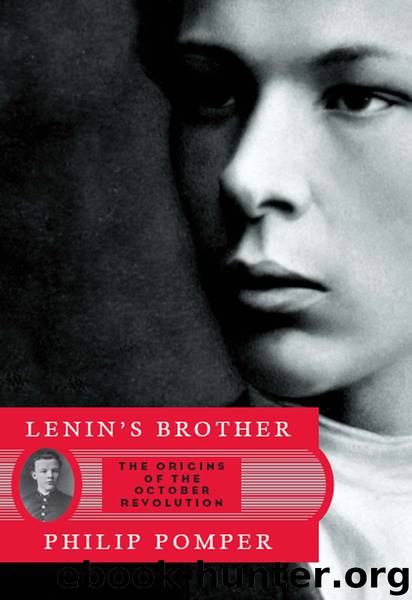Lenin's Brother by Philip Pomper

Author:Philip Pomper
Language: eng
Format: epub
Publisher: W. W. Norton & Company
Published: 2010-05-05T16:00:00+00:00
BY THE LATE 1880s relations between police and institutions of higher education had become virtually routine—not necessarily a good thing for the authorities. Students expected police agents to show up at private apartments when five or more students gathered, presumably for parties. The revelers ordinarily served their visitors enough strong drink to soften their vigilance. Student festivities were often Potemkin villages of a sort, fake name-day celebrations or engagement parties with dancing, music, and a prominent display of bottles—façades for serious backroom political discussion. Despite this slackness in some areas, the authorities had infiltrated all of the subversive groups and illegal zemlyachestva. Threatened with expulsion or worse, some students became police collaborators. Others who had been arrested for illegal activity bargained with the police and served as double agents or stool pigeons. In prisons the police planted them where they could tease out information for use in court, or turn the prisoners against each other by spreading disinformation.
Under Dmitry Tolstoy, minister of the interior from 1882 to 1889, and Vyacheslav Von Plehve, the head of the Police Department between 1881 and 1884, spying reached a new level. They gave Gregory Sudeikin, already head of the St. Petersburg Security Bureau and bane of the People’s Will, even greater authority in January 1883. A secret directive of June 5, 1882, issued at the beginning of Tolstoy’s tenure, created the “black offices” for systematic invasion of the empire’s mail. Until this time the practice of opening and replacing private letters had been performed relatively infrequently. Things changed quickly. In 1882 alone twenty employees in seven such clandestine operations located in post offices in the Russian Empire’s major cities opened 380,000 letters.3 The practice, called “perlustration,” gave the St. Petersburg police the crucial information they needed to round up the Second March First conspiracy. The black office had been reading some of Andreyushkin’s correspondence, which yielded an indiscreet letter of January 20, 1887, to a student in Kharkiv University, Ivan Platon-ovich Nikitin. This inexplicably careless letter gave the police every reason to believe that Andreyushkin was serious about terrorism:
Download
This site does not store any files on its server. We only index and link to content provided by other sites. Please contact the content providers to delete copyright contents if any and email us, we'll remove relevant links or contents immediately.
Fanny Burney by Claire Harman(26591)
Empire of the Sikhs by Patwant Singh(23069)
Out of India by Michael Foss(16842)
Leonardo da Vinci by Walter Isaacson(13306)
Small Great Things by Jodi Picoult(7112)
The Six Wives Of Henry VIII (WOMEN IN HISTORY) by Fraser Antonia(5493)
The Wind in My Hair by Masih Alinejad(5085)
A Higher Loyalty: Truth, Lies, and Leadership by James Comey(4946)
The Crown by Robert Lacey(4802)
The Lonely City by Olivia Laing(4796)
Millionaire: The Philanderer, Gambler, and Duelist Who Invented Modern Finance by Janet Gleeson(4457)
The Iron Duke by The Iron Duke(4346)
Papillon (English) by Henri Charrière(4251)
Sticky Fingers by Joe Hagan(4185)
Joan of Arc by Mary Gordon(4092)
Alive: The Story of the Andes Survivors by Piers Paul Read(4017)
Stalin by Stephen Kotkin(3955)
Aleister Crowley: The Biography by Tobias Churton(3628)
Ants Among Elephants by Sujatha Gidla(3459)
